Showing 61-69 of 69 results
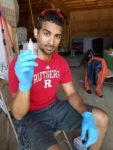
Rutgers student traces genetic trail of BMSB
Knowing that early detection is the most effective strategy to control invasive species, Rutgers University PhD student Rafael Valentin used his Northeast SARE Graduate Student grant to explore a technique using insect DNA to track the brown marmorated stinkbug (BMSB, Halyomorpha halys). Within the past 20 years, BMSB has become a devastating pest across the […]
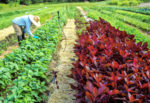
Food hub faces the challenges of scaling up ethnic produce
The New Entry Sustainable Farming Project (NESFP), led by Jennifer Hashley, has a 20-year history of training next generation farmers—including immigrant and refugee growers—to improve local food systems. A recent Northeast SARE Partnership grant supported the Project’s food hub initiative aimed at long-term economic self-reliance among farmers while expanding access of healthy, culturally-appropriate foods in […]

Weed Weasel prototype provides weed cultivation options for small-scale farms
Weed management is crucial on vegetable farms of all scales but may be particularly challenging for small-scale farms as hand weeding is time consuming while tractor cultivation may not fit with smaller acreages. So, with his Northeast SARE Partnership grant, Jan “Lu” Yoder of Woodmetalcanvas in Westport, MA collaborated with local farmers to build, test […]
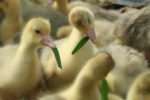
Geese on Pasture
Wesley Bascom of Gozzard City LLC conducted a Northeast SARE Farmer Grant project to look at pastured goose production in northern Vermont. Wesley wanted to track the impact of different levels of grain supplementation for geese on pasture. He divided the goose flock into three groups of approximately 60 each and supplemented one group with […]

Pollinator buffers improve poultry farm sustainability & neighbor relations
Like many farms across the region, Hill Farms, Inc. in Houston, Delaware has seen in increase in residential development surrounding their farm. Because maintaining positive neighbor relations is important to this poultry operation, owner Tina Hill conducted a Northeast SARE Farmer Grant project to install a mixed vegetative buffer adjacent their poultry houses. Tina was […]
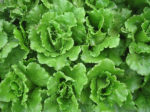
Project expands leafy green production in WV's Eastern panhandle
The Eastern Panhandle region of West Virginia is the fastest growing area in the state and is adjacent to large, diverse populations like Washington, D.C. and Baltimore. To meet the emerging demand for fresh produce from regional wholesale markets like hospitals, school districts and other institutional buyers, Lewis Jett of West Virginia University conducted a […]
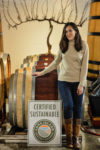
Sustainable wine course goes online
In the vineyard industry, the task of communicating to customers is often left to winery sales and hospitality staff who may not know much about the farming end of the business. Whitney Beaman of Bedell Cellars in Cutchogue, NY recognized that educating winery employees who hold customer-facing roles (including tasting room, wine club and wholesale […]

Maine leads project using winter ecology to manage small ruminant parasites
For many small ruminant operations, grazing is central to farm profitability. However, grazing livestock increases risks of losses due to parasite-infested pastures. Haemonchus contortus, Barber pole worm, is a particular threat to sheep and goat farms throughout the Northeast region. Although H. contortus (as a subtropical parasite) has adapted to northern climates, Jim Weber of […]

UMD student studies the intersection of food safety and irrigation water
Salmonella enterica is the most common cause of foodborne illness in the United States. Since Salmonella has been a food safety concern for vegetables produced on the Eastern Shore of Maryland with surface water and sediments identified as possible reservoirs for these bacteria, University of Maryland student Angela Ferelli conducted a Northeast SARE Graduate Student […]